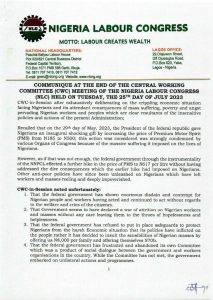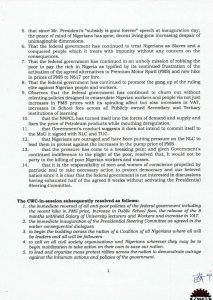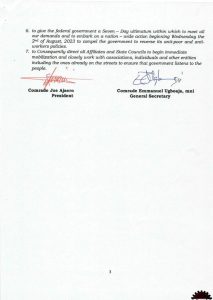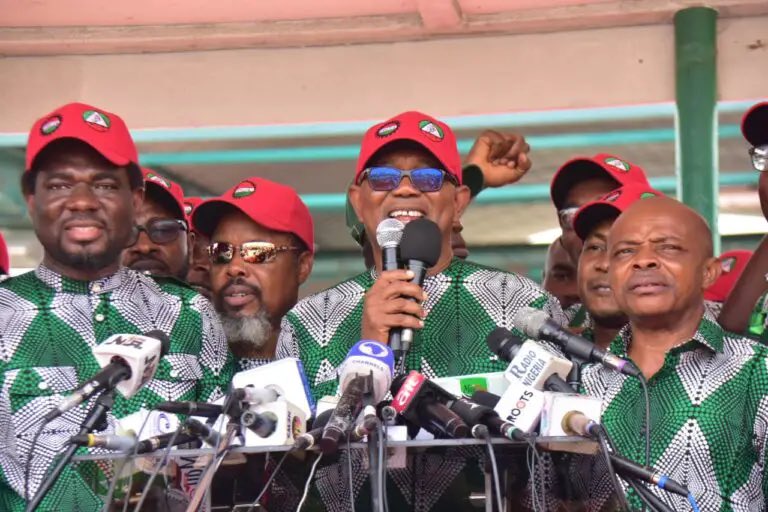The Nigerian Labour Congress last week at its Central Working Committee meeting threatened to carry out a nationwide protest from Wednesday, August 2, 2023 should the Federal Government fail to among other things reverse the subsidy removal on PMS, reverse increase in public fees and release 8 months withheld salaries of ASUU members who embarked on an 8-months strike last year. All these and other demands were contained in a 3-page Communique it issued at the end of the CWC meeting.



While going through that communique issued by the NLC, I could not but notice the mischievous use of language by the NLC and the spewing of half-truths, misinformation and outright falsehoods by the Joe Ajaero-led NLC designed to stir anger and generate sympathy for it in the hearts of the Nigerian people. For example NLC falsely accused the NNPC Ltd of ‘turning itself into the forces of demand and supply and fixes prices of petroleum products while mouthing deregulation’. This shows that NLC either lacks proper understanding of the new status of NNPC Ltd or it is simply acting a strange partisan script on behalf of its political arm, the Labour Party.
It is common knowledge that with the enactment of the Petroleum Industry Act 2021, NNPC was unbundled and became a commercial concern. Crucially it lost the powers to fix price for petroleum products including PMS. NNPC Ltd has a retail arm, which operates in the downstream oil and gas sector alongside other independent oil marketers and just like other players in the sector, it determines what the pump price of PMS should be in its retail outlets ONLY after computing landing costs and other ancillary expenses.
The price band of NNPC Ltd (which by the way is not uniform across the country) is not meant to be a regulated price for every petroleum products marketer to follow or abide by. Other marketers are required to carry out their own computation and determine what their pump price should in line with market forces. It is therefore unfortunate that NLC, who should know better, is misinforming its members and unsuspecting members of the public by accusing the NNPC Ltd of being responsible for PMS price hikes and chiding the company as ‘turning itself into the forces of demand and supply’.
Joe Ajaero and his Central Working Committee colleagues need to be more responsible in their communication. It is very clear that subsidy has gone, which means the price of PMS is subject to the pull of market forces, especially the price of crude oil in the international market, which is the primary raw material for the production of PMS. They do not expect that in an era without subsidy, prices of PMS would be constant when the price of the crude oil is fluctuating. The NNPC Ltd and the federal government for that matter does not fix prices of petroleum products anymore.
NLC at this point should not be advocating for a reversal in PMS price hike because the Federal Government cannot reverse what it did not set in the first place. Crucially, there is no way the pump price of PMS will be pegged at a price below the market price as they will mean returning to the era of subsidy payment. It is even more disconcerting that NLC feels that its advise to government to tackle the criminal component of subsidy as a way of reforming the subsidy regime and bringing it back is anything near feasible.
The above position of NLC betrays its lack of understanding of what the issues are. In case Joe Ajaero is not aware, Nigeria for more than 30 years have been trying endlessly to deal with the so-called criminal component of petrol subsidy with little success even when NNPC became the sole importer of petrol. The major problem is our porous borders and the thriving cross border smuggling of subsidised fuel, which end supplying our neighbours in West and Central Africa with cheap fuel at the expense of our treasury. This has defied solution and we cannot afford to continue digging holes in our lean purse.
If NLC and its partner unions want to protest, it should not be to protest against the removal of fuel subsidy and calling for its return, because the NLC during the last presidential election adopted the candidate of the Labour Party (a party it formed), Mr. Peter Obi whose manifesto was clear about subsidy removal and unification of the foreign exchange windows. They did not raise any objections then and certainly should not raise any now. Besides the issue of subsidy removal is a matter of law as encapsulated in the PIA-2021, which NLC and TUC were integral participants in its enactment process.
NLC should rather be concerned with measures the federal government and subnational governments must put in place to ameliorate the impacts of the subsidy removal on Nigerian workers and families. They should push for faster negotiation of salary awards and a new national minimum wage that will raise the income available to workers so as to neutralise the increased cost of living. NLC should also be focused on how to transition our transportation sector to be powered by cheaper fuels such as compressed natural gas (CNG) and bringing more efficient transport systems especially rail transport to the nooks and crannies of the country.
These are the areas of discussion the labour centers should channel their attention to and not demanding the reversal of the fuel subsidy. The federal government led by President Bola Ahmed Tinubu has been open about putting in place a comprehensive solution mix to help Nigeria weather this storm and get used to the new reality of a post-subsidy Nigeria. Part of these measures include review of the national minimum wage, stimulating of the productive sector of the economy such as credit facilities to big manufacturing businesses, MSMEs and nano businesses; agricultural expansion drive, infrastructural renaissance and social investment (as announced in President Tinubu’s recent national broadcast).
The Nigerian Labour Congress under the leadership of Mr. Joe Ajaero should learn lessons from the unfortunate behaviour of the Academic Staff Union of Universities (ASUU) that led to a needless disruption of the academic calendar of our public tertiary institutions for 8 months last year. The NLC should remove the garment of an opposition Labour Party and wear that of a responsible Labour Union that negotiates reasonably and makes demands that are realistic. The NLC must not be used as tool to fight the battles of those looking for any possible avenue to destabilise Nigeria. A word is enough for the wise.

